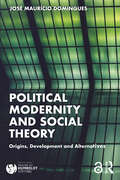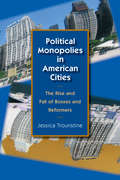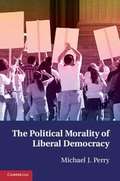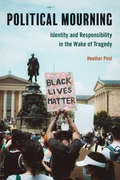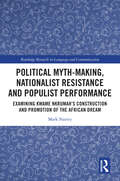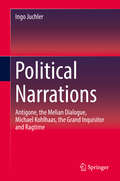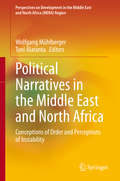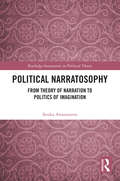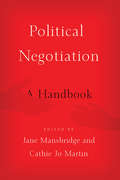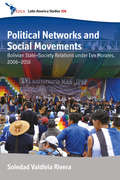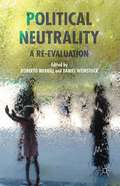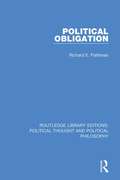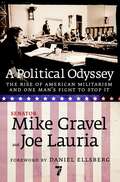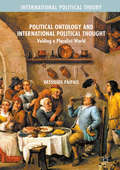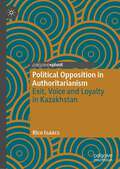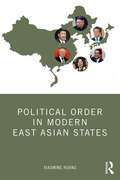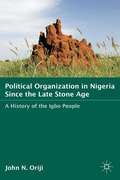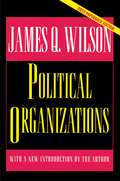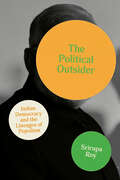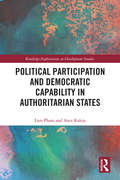- Table View
- List View
Political Modernity and Social Theory: Origins, Development and Alternatives
by Jose Maur¡cio DominguesModern liberal democracy and authoritarian collectivism have known diverse political regimes; autocratic, oligarchic or democratic, they each consist of a mixed, partly oligarchic regime in which plebeian politics are subordinated. With authoritarian collectivism’s defeat, a return to modernity has produced one more hybrid configuration.An in-depth investigation of political modernity and how it is differentiated from other forms of society, this book researches its origins and trajectory as a specific dimension of modern civilisation – articulating a renewed critical theory through an analysis of rights and law, politics, state and autonomy, social reproduction, crisis and political change.Examining these diverse aspects, Political Modernity and Social Theory proposes an encompassing and far-reaching approach spanning past and present – stressing radical plebeian democracy and maintaining a strong opening to the future and to possible alternatives to modernity.The Open Access version of this book, available at www.taylorfrancis.com, has been made available under a Creative Commons Attribution (CC-BY) 4.0 license.
Political Monopolies in American Cities: The Rise and Fall of Bosses and Reformers
by Jessica TrounstineAround the same time that Richard J. Daley governed Chicago, greasing the wheels of his notorious political machine during a tenure that lasted from 1955 to his death in 1976, Anthony “Dutch” Hamann’s “reform” government centralized authority to similar effect in San Jose. In light of their equally exclusive governing arrangements—a similarity that seems to defy their reputations—Jessica Trounstine asks whether so-called bosses and reformers are more alike than we might have realized. Situating her in-depth studies of Chicago and San Jose in the broad context of data drawn from more than 240 cities over the course of a century, she finds that the answer—a resounding yes—illuminates the nature of political power. Both political machines and reform governments, she reveals, bias the system in favor of incumbents, effectively establishing monopolies that free governing coalitions from dependence on the support of their broader communities. Ironically, Trounstine goes on to show, the resulting loss of democratic responsiveness eventually mobilizes residents to vote monopolistic regimes out of office. Envisioning an alternative future for American cities, Trounstine concludes by suggesting solutions designed to free urban politics from this damaging cycle.
Political Monopolies in American Cities: The Rise and Fall of Bosses and Reformers
by Jessica TrounstineAround the same time that Richard J. Daley governed Chicago, greasing the wheels of his notorious political machine during a tenure that lasted from 1955 to his death in 1976, Anthony “Dutch” Hamann’s “reform” government centralized authority to similar effect in San Jose. In light of their equally exclusive governing arrangements—a similarity that seems to defy their reputations—Jessica Trounstine asks whether so-called bosses and reformers are more alike than we might have realized. Situating her in-depth studies of Chicago and San Jose in the broad context of data drawn from more than 240 cities over the course of a century, she finds that the answer—a resounding yes—illuminates the nature of political power. Both political machines and reform governments, she reveals, bias the system in favor of incumbents, effectively establishing monopolies that free governing coalitions from dependence on the support of their broader communities. Ironically, Trounstine goes on to show, the resulting loss of democratic responsiveness eventually mobilizes residents to vote monopolistic regimes out of office. Envisioning an alternative future for American cities, Trounstine concludes by suggesting solutions designed to free urban politics from this damaging cycle.
The Political Morality of Liberal Democracy
by Michael J. PerryIn this important new work in political and constitutional theory, Michael Perry elaborates and defends an account of the political morality of liberal democracy: the moral convictions and commitments that in a liberal democracy should govern decisions about what laws to enact and what policies to pursue. The fundamental questions addressed in this book concern (1) the grounding, (2) the content, (3) the implications for one or another moral controversy, and (4) the judicial enforcement of the political morality of liberal democracy. The particular issues discussed include whether government may ban pre-viability abortion, whether government may refuse to extend the benefit of law to same-sex couples, and what role religion should play in the politics and law of a liberal democracy.
Political Mourning: Identity and Responsibility in the Wake of Tragedy
by Heather PoolWhat leads us to respond politically to the deaths of some citizens and not others? This is one of the critical questions Heather Pool asks in Political Mourning. Born out of her personal experiences with the trauma of 9/11, Pool’s astute book looks at how death becomes political, and how it can mobilize everyday citizens to argue for political change. Pool examines four tragedies in American history—the Triangle Shirtwaist Factory Fire, the lynching of Emmett Till, the September 11 attacks, and the Black Lives Matter movement—that offered opportunities to tilt toward justice and democratic inclusion. Some of these opportunities were taken, some were not. However, these watershed moments show, historically, how political identity and political responsibility intersect and how racial identity shapes who is mourned. Political Mourning helps explain why Americans recognize the names of Trayvon Martin and Sandra Bland; activists took those cases public while many similar victims have been ignored by the news media. Concluding with an afterword on the coronavirus, Pool emphasizes the importance of collective responsibility for justice and why we ought to respond to tragedy in ways that are more politically inclusive.
Political Myth-making, Nationalist Resistance and Populist Performance: Examining Kwame Nkrumah's Construction and Promotion of the African Dream (Routledge Research in Language and Communication)
by Mark NarteyUsing the socio-political discourse of Kwame Nkrumah, a pioneering Pan-Africanist and Ghana’s independence leader, Nartey investigates the notion of political myth-making in a context underexplored in the literature. He examines Nkrumah’s construction of a myth described in the book as the Unite or Perish myth (i.e. the idea of a ‘United States of Africa’ being a prerequisite for the survival of Africa in the post-independence period), exploring the rhetorical resources he deployed, categorizing and analyzing key tropes and metaphors, and setting out the myth’s basic components. This book focuses on three areas: an investigation of political myth-making as a social and discursive practice in order to identify particular semiotic practices and linguistic patterns deployed in the construction of mythic discourse, the unpacking of the discursive manifestation, representation, features and functions of political mythic themes, and finally to propose and implement an integrated discourse analytical framework to account for the complexities of mythic discourse and political narratives in general. It analyzes how Nkrumah deployed his discourse to concurrently construct heroes and villains, protagonists and antagonists as part of an ideological mechanism aimed at galvanizing support for and instigating action on the part of the masses towards his lifelong African dream. Nartey’s book steps out from the conventional domain of critical discourse studies to focus on myth as a form of populist performance. It will be of interest to postgraduate students and academics in (critical) discourse studies, rhetorical discourse analysis, African and Diaspora studies, and African history as well as non-academics such as journalists, political commentators, and people who consider themselves to be Nkrumaists and Pan-Africanists.
Political Narrations: Antigone, The Melian Dialogue, Michael Kohlhaas, The Grand Inquisitor And Ragtime
by Ingo JuchlerThis book analyzes narrations embedded in political disputes, allowing readers to gain a deeper understanding of modern political reality. The author explores this theme in readings of the Sophocles tragedy Antigone, the Melian Dialogue of Thucydides, Heinrich von Kleist’s novella Michael Kohlhaas, Fyodor Dostoevsky's The Grand Inquisitor and E.L. Doctorow’s Ragtime novel, taking into account the relevant interdisciplinary aspects of the narratives. His study of these four narrations focuses on key political concepts, such as might and right, self-interest, legality and justice, the nation-state and democracy, and relates them compellingly to current actuality. Since narrations can exert comprehensive and lasting influence on individuals’ political discernment, this systematic analysis allows for a better comprehension of politics in education and civics.
Political Narratives in the Middle East and North Africa: Conceptions of Order and Perceptions of Instability (Perspectives on Development in the Middle East and North Africa (MENA) Region)
by Toni Alaranta Wolfgang MühlbergerThis book discusses the role of political narratives in shaping perceptions of instability and conceptions of order in the Middle East and North Africa (MENA). The authors illustrate how, in times of socio-political turmoil and outbursts of discontent such as the Arab Spring, political entrepreneurs explain and justify their political agendas by complementing hard power solutions with attractive ideas and discursive constructions that appeal to domestic constituencies and geopolitical allies. The book is divided into two parts. The first focuses on non-state actors, such as confessional communities and ideological movements, who aim to develop narratives that are convincing to their respective polities. It also studies regional powers that seek to determine their positions in a competitive environment via distinctive narrations of order. In part two, the authors investigate the narratives of global players that aim to explain and justify their role in an evolving international order.
Political Narratosophy: From Theory of Narration to Politics of Imagination (Routledge Innovations in Political Theory)
by Senka AnastasovaPolitical Narratosophy offers a critically subversive rethinking of the political and philosophical significance of narrative, and why feminist epistemology and feminist social theory matters for the meaning of the ‘self’ and narrativity. Through a re-examination of the notions of democracy and emancipation, Senka Anastasova coins the term ‘political narratosophy’, a unique interpretation of the philosophy of narrative, identification, and disidentification, developed in conversation with philosophers Jacques Rancière, Nancy Fraser, and Paul Ricoeur. Utilizing the author’s own identity as a feminist philosopher has lived in socialist Yugoslavia, post-Yugoslavia, and Macedonia (now North Macedonia), Anastasova explores the fluctuating and disappearing borders around which identity is situated in a country that no longer exists. She expertly reveals how the subject finds, makes and unmakes itself through narrativity, politics, and imagination. Political Narratosophy is an important intervention in political philosophy and a welcome contribution to the historiography on female authors who lived through twentieth century communism and its aftermath. It will be of great interest to scholars and researchers in the fields of political theory, philosophy, women’s studies, international relations, identity studies, (comparative) literary studies, and aesthetics studies.
Political Negotiation: A Handbook
by Jane Mansbridge Cathie Jo MartinPolarization. Partisanship. Rancor. Character assassinations. Government shutdowns. Why can't our elected officials just get along and do their jobs? The United States was once seen as a land of broad consensus and pragmatic politics. Sharp ideological differences were largely absent. But today politics in America is dominated by intense party polarization and limited agreement among legislativerepresentatives on policy problems and solutions. Americans pride themselves on their community spirit, civic engagement, and dynamic society. Yet, as the editors of this volume argue, we are handicapped by our national political institutions, which often-but not always-stifle the popular desire for policyinnovation and political reforms. Negotiating Agreement in Politics explores both the domestic and foreign political arenas to understand the problems of political negotiation. The editors and contributors share lessons from success stories and offer practical advice for overcoming polarization. Indeliberative negotiation, the parties share information, link issues, and engage in joint problem solving. Only in this way can they discover and create possibilities, and use their collective intelligence for the good of citizens of both parties and for the country.
Political Negotiation
by Cathie Jo Martin Jane MansbridgePolarization. Partisanship. Rancor. Character assassinations. Government shutdowns. Why can't our elected officials just get along and do their jobs?The United States was once seen as a land of broad consensus and pragmatic politics. But today politics in America is dominated by intense party polarization on policy problems and solutions. As this volume argues, we as a nation are handicapped by our partisanravaged national political institutions, which often stifle the popular desire for policy innovation and political reforms. Political Negotiation: A Handbook explores both domestic and foreign political arenas to understand the problems of political negotiation. The editors and contributors share lessons from success stories and offer practical advice for deliberative negotiation to overcome polarization. When individual members of parties share information, link issues, and engage in joint problem solving, political negotiation becomes possible-- for the good of citizens and for the country.
Political Networks and Social Movements: Bolivian State–Society Relations under Evo Morales, 2006–2016 (CEDLA Latin America Studies #106)
by Soledad Valdivia RiveraAfter a landslide electoral victory in 2006, Evo Morales became the first indigenous President of Bolivia. Morales’s stunning ascent was mirrored by the rising fortunes of his political party, the leftist Movimiento al Socialismo, which today continues to challenge the status quo in Bolivian politics and implement ambitious social reforms. This study examines how the state and social movements have impacted democratization in Bolivia, along with other sectors such as NGOs and the media. Soledad Valdivia Rivera’s analysis helps us to understand how their relationships have come to transform the Bolivian political process as we know it.
Political Neutrality
by Roberto Merrill Daniel WeinstockThe topic of neutrality on the good is linked rather closely to the ideal of political liberalism as formulated by John Rawls. Here internationally renowned authors, in several cases among the most prominent names to be found in contemporary political theory, present a collection of ten essays on the idea of liberal neutrality.
Political Obligation (Routledge Library Editions: Political Thought and Political Philosophy #21)
by Richard E. Flathman"Under what conditions are obedience and disobedience required or justified? To what or whom is obedience or disobedience owed? What are the differences between authority and power and between legitimate and illegitimate government? What is the relationship between having an obligation and having freedom to act? What are the similarities and differences among political, legal, and moral obligations?..." Originally published in 1972, Professor Flathman discusses these crucial issues in political theory in a lucid and stimulating argument. Though mainly concerned to develop his own modified utilitarian standing point he also reviews both the classical and modern literature from Plato and Hobbes to Hare and Rawls. The treatment is philosophical but it is frequently related to practical issues of civil obedience and disobedience and in particular focuses on the relation between law, obligation and social change.
Political Obligation: A Critical Introduction (Routledge Contemporary Political Philosophy)
by Dudley KnowlesPolitical obligation is concerned with the clash between the individual’s claim to self-governance and the right of the state to claim obedience. It is a central and ancient problem in political philosophy. In this authoritative introduction, Dudley Knowles frames the problem of obligation in terms of the duties citizens have to the state and each other. Drawing on a wide range of key works in political philosophy, from Thomas Hobbes, John Locke, David Hume and G. W. F. Hegel to John Rawls, A. John Simmons, Joseph Raz and Ronald Dworkin, Political Obligation: A Critical Introduction is an ideal starting point for those coming to the topic for the first time, as well as being an original and distinctive contribution to the literature. Knowles distinguishes the philosophical problem of obligation - which types of argument may successfully ground the legitimacy of the state and the duties of citizens - from the political problem of obligation - whether successful arguments apply to the actual citizens of particular states. Against the anarchist and modern skeptics, Knowles claims that a plurality of arguments promise success when carefully formulated and defended, and discusses in turn ancient and modern theories of social contract and consent, fairness and gratitude, utilitarianism, justice and a Samaritan duty of care for others. Against modern communitarians, he defends a distinctive liberalism: ‘the state proposes, the citizen disposes’.
A Political Odyssey: The Rise of American Militarism and One Man's Fight to Stop It
by Mike GravelIn this candid portrait, former two-term senator from Alaska and 2008 presidential candidate Gravel expounds on his views of the military-industrial complex, the imperial presidency, postwar US foreign policy, and corporate America; critically assesses figures he worked with, such as Jimmy Carter and Ted Kennedy; and reveals the private life behind the public persona. When he isn't being actively silenced, Senator Gravel's voice is generally acknowledged to be the most refreshing and honest of all the 2008 presidential candidates.
Political Ontology and International Political Thought: Voiding a Pluralist World (International Political Theory)
by Vassilios PaipaisThis book challenges received notions of ontology in political theory and international relations by offering a psychoanalytically informed critique of depoliticisation in prominent liberal, post-liberal, dialogic and agonistic approaches to pluralism in world politics. Paipais locates the temptation of depoliticisation in their labouring under the fundamental fantasy of various guises of foundationalism (in the form of either political anthropology or ontology as ‘in the last instance’ ground) or, conversely, anti-foundationalism (the denial of all grounds, yet still operating within a foundationalist imaginary). He argues, instead, for a formal political ontology of the void (against historicism) shot through an ‘incarnate’ messianic nihilism (against ethicism and teleological forms of politics). In so doing, the author offers critical readings of the messianic nihilism of Benjamin, Agamben, Taubes and Žižek by problematising the antinomian tendencies in their respective political theologies. The book argues for a version of Žižek’s Badiouian politics of militancy supplemented by a proper participatory understanding of St Paul’s messianic meontology and incarnational Christology as a means to reconceptualise the nexus between subjectivity, universality and political action in world politics. It will be of interest to students and scholars of International Relations theory, political theory, critical social theory and political theology.
Political Opportunities for Climate Policy
by Roger KarapinAnalysis of climate change policies focuses mainly on the prospects for international agreements or how climate policies should be designed. Yet effective domestic climate policies are essential to any global solution, and we know too little about how and why such policies are adopted. Political Opportunities for Climate Policy examines in depth the causes of effective climate policies in the United States, using a statistical analysis of all fifty states and long-term case studies of California, New York, and the federal government. Roger Karapin analyzes twenty-two episodes in which policies were adopted, blocked, or reversed. He shows that actors and events have positively affected climate policy making, despite the constraints presented by political institutions and powerful fossil fuel industries. Climate policy advocates have succeeded when they mobilized vigorously and astutely during windows of opportunity - which opened when events converged to raise both problem awareness and the political commitment to address them.
Political Opposition in Authoritarianism: Exit, Voice and Loyalty in Kazakhstan (The Theories, Concepts and Practices of Democracy)
by Rico IsaacsHow might political opposition shape regime outcomes over time in an authoritarian system? Most studies on political opposition in authoritarian contexts tend to focus on the agency of the regime over and above that of the political opposition. Using Albert Hirschman’s framework of exit, voice and loyalty, this book examines the case of Kazakhstani opposition agency over 30 years to explore the extent to which political opposition in Kazakhstan has shaped the dynamics of authoritarian regime development in the country. What the analysis reveals is that in Kazakhstan the regime has tended to treat formal institutional political opposition as neither a credible nor non-credible threat. Consequently, the Kazakhstani regime has always responded to opposition exit and voice with sanctions and institutional adaption which strengthened the regime in the short to medium term, but left them exposed to spontaneous, grassroots non-institutional opposition in the longer term. This spontaneous grassroots opposition emerged in Kazakhstan as a series of ‘shocks’ crystalised in the 2011 events in Zhanaozen, the 2016 land protests, the 2019 election protests and the events of ‘qandy qantar’ (bloody January) in 2022. What this book illustrates is how authoritarian regimes which treat opposition threats ambiguously are likely to end up in a continuous state of instability because the feedback provided by opposition agency disappears leaving the regime susceptible to spontaneous opposition.
Political Order and Inequality
by Carles BoixThe fundamental question of political theory, one that precedes all other questions about the nature of political life, is why there is a state at all. Is human cooperation feasible without a political authority enforcing it? Or do we need a state to live together? This problem then opens up two further questions. If a state is necessary to establish order, how does it come into place? And, when it does, what are the consequences for the political status and economic welfare of its citizens? Combining ethnographical material, historical cases, and statistical analysis, this book describes the foundations of stateless societies, why and how states emerge, and the basis of political obligation. As a result of this inquiry, it explains the economic and political roots of inequality, describes the causes of the stagnation of the preindustrial world, and explores what led to the West's prosperity of the past two centuries.
Political Order in Modern East Asian States
by Xiaoming HuangThis text explains political change and the shaping of political order in modern East Asian states: China, Japan, North Korea, South Korea, Taiwan, and Vietnam. Examining the transformative role of power, authority, and political culture in the shaping of political order, this book: Describes the emergence of statist and pluralist political order in East Asia. Outlines the dual process of state-building and nation-building, revealing the transformative role of the state. Highlights the causes and consequences of the reversion to centralized political order, describing the structure and institutions of Cold War regimes in East Asian states. Explores the structural and institutional consequences of industrial development on politics and state in East Asian states. Discusses the methods and outcomes of the democratization movements in the 1980s and 1990s and public sector reforms in the 1990s and 2010s. Utilizes survey data and newly developed indicators to measure and reveal the shaping of national political culture in each East Asian state. Features structural, institutional, and normative analysis of political change in modern East Asia. This will be an essential textbook for students of Political Science, International Relations, East Asian Politics and East Asian History, as well as policy analysts of East Asian states.
Political Organization in Nigeria since the Late Stone Age: A History of the Igbo People
by John N. OrijiAlthough the Igbo constitute one of the largest ethnic nationalities of Nigeria and the West African sub-region, little is known about their political history before the Trans-Atlantic slave trade. This book is a pioneer study of the broad changes Igbo political systems have undergone since the prehistoric period.
Political Organizations: Updated Edition (Princeton Studies in American Politics: Historical, International, and Comparative Perspectives #189)
by James Q. WilsonA major work by one of America's eminent political scientists, Political Organizations has had a profound impact on how we view the influence of interest groups on policymaking. James Wilson wrote this book to counter two ideas: that popular interests will automatically generate political organizations and that such organizations will faithfully mirror the opinions and interests of their members. Moreover, he demonstrated that the way in which political organizations (including parties, business groups, labor unions, and civil rights associations) are created and maintained has a profound impact on the opinions they represent and the tactics they use. Now available for the first time in paperback, this book has broadened its scope to include recently developed organizations as it addresses many of today's concerns over the power of such groups as special-interest lobbies. In 1973, when this book was first published, the press and public were fascinated by the social movements of the 1960s, thinking that the antiwar and civil rights movements might sweep aside old-fashioned interest-group lobbies. Wilson argued, however, that such movements would inevitably be supplanted by new organizations, ones with goals and tactics that might direct the course of action away from some of the movements' founding principles. In light of the current popular distress with special-interest groups and their supposed death-grip on Congress, Wilson again attempts to modify a widely held view. He shows that although lobbies have multiplied in number and kind, they remain considerably constrained by the difficulty they have in maintaining themselves.
The Political Outsider: Indian Democracy and the Lineages of Populism (South Asia in Motion)
by Srirupa RoyDefying the dire predictions that attended its birth as an independent nation-state in 1947, the Indian republic is more than seventy-five years old. And yet, it is a place where criticisms of actually existing democracy are intense and strident. In recent years, the trope of victimized people suffering at the hands of a predatory elite and political dysfunction has reaped rewards. The populist language of redemptive outsiders pledging to combat a corrupt system has been harnessed in successful electoral campaigns, like the majoritarian regime of Narendra Modi. Tracking the shift from postcolonial nation-building to democracy-rebuilding, Srirupa Roy shows how the political outsider came to be a valorized figure of late-twentieth century Indian democracy, tasked with the urgent mission of curing a broken democratic system—what Roy terms "curative democracy." Drawing attention to an ambivalent political field that folds together authoritarian and democratic forms and ideas, Roy argues that the long 1970s were a crucial turning point in Indian politics, when democracy was suspended by the declaration of a national emergency and then subsequently restored. By tracing the crooked line that connects the ideals of curative democracy and the political outsider to the populist antipolitics and strongman authoritarian rule in present times, this book revisits democracy from India, and asks what the Indian experience tells us about the trajectory of global democratic politics.
Political Participation and Democratic Capability in Authoritarian States (Routledge Explorations in Development Studies)
by Lien Pham Ance KalejaThis book provides an innovative theoretical and empirical exploration of the political participation and democratic capability of people living in authoritarian states. Merging perspectives from sociology and political science, the book demonstrates that despite autocratic restrictions on opposition, there is often still leeway for people to express themselves as political agents and to develop democratic capability. The first two chapters problematise political participation and develop an interdisciplinary three-domain framework that allows for critical engagement with and appreciation of the contexts and varied ways in which participatory activities occur. This framework is applied to analyse six country case studies: Singapore, Jordan, Belarus, Cuba, Nigeria, and Vietnam. Drawing on a range of data sources and different analytical entry points, the book investigates the substantive opportunities people have in exercising political agency and the implications for democratic capability. The book concludes by summarising the emergent themes and examining the potential of applying this method of inquiry in other political contexts. Encompassing both governmental and societal practices, the book offers insights into state-society relations and their role in constructing political values and goals for participation, which people negotiate and mediate to inform their choices, modes, and forms of civic engagement. These insights present a broad approach towards the study of participation, with relevance for understanding political participation in various societies under non-democratic and democratic rule alike. This book will be useful for researchers and students interested in political dynamics and intersections with economic, cultural, and social aspects of development. It will also be beneficial for practitioners interested in participatory actions and social change.
